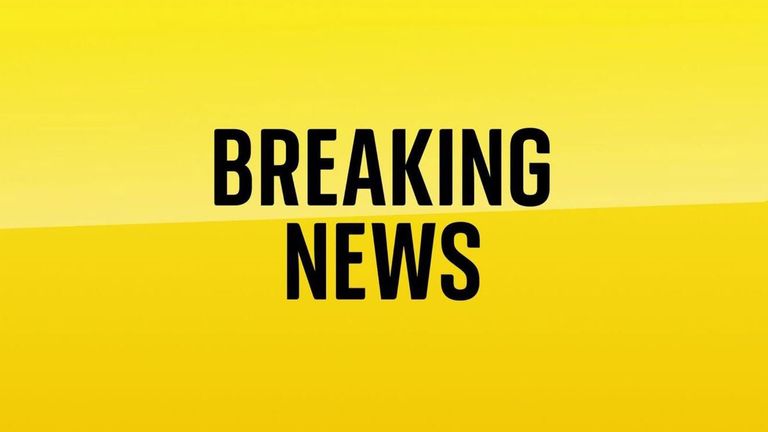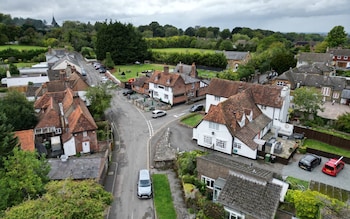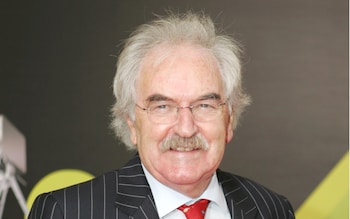NEW YORK (AP) — A lively discussion broke out backstage during Climate Week NYC between a TikTok comedian, a buzzed-about actress, a Latin cuisine entrepreneur and a cooking content creator.
Convened by World Food Program USA to educate the panel’s audiences — over 1.8 million Instagram followers combined — about hunger, the four weighed best practices for authentically breaking down weighty topics on social media.
“I want to force myself to be more active on TikTok,” said “ Avatar: The Way of Water ” star Bailey Bass. Users “have a thought, and they are talking on their phone, and they post it. It feels very palpable.”
“But how do you know this is true?” asked Manolo Gonzalez Vergara, who co-founded the culinary brand Toma with his mother and actress Sofia Vergara. “This is just a person talking.”
“But it’s someone you can relate with, so there’s a level of trust,” added Drea Okeke, a Nigerian-American engineer turned social media star with over 6 million TikTok followers.
The exchange underscored the questions faced by the humanitarian establishment as they try to reach younger, more environmentally conscious generations who — they routinely acknowledged throughout the many events unfolding this week alongside the United Nations General Assembly in New York — are tasked with digging the world out of the hole left by years of climate inaction.
Billionaire Microsoft co-founder Bill Gates acknowledged as much at a Thursday Q&A promoting his new Netflix show. “We have left some real challenges for this next generation,” acknowledged Gates, who runs one of the world’s largest philanthropic foundations.
Young people with large online followings can be good “placeholders” for older institutions seeking relevance with new generations, said Wawa Gatheru. The Kenyan-American activist regularly uses Instagram to promote Black Girl Environmentalist, the national community she founded to diversify the climate movement’s leadership pipeline.
But Gatheru cautioned against looping “any young person who is visible online as an influencer” or, alternatively, cheapening youth leaders’ expertise simply because they are active online.
“In order to do it well and effectively and not be tokenistic, it’s so important to see young people as collaborators, young people as capable,” she told The Associated Press.
“Content creator” lanyards hung from some Clinton Global Initiative attendees’ necks in a new feature of the yearly gathering hosted by the former First Family’s philanthropic foundation.
The two-day event marked the first time that organizers intentionally dedicated space for influencers to collaborate. It came from the recognition that creators help shape how “millions of people relate to others and understand their world,” according to Clinton Foundation Chief Brand and Digital Officer Francesca Ernst-Khan.
There, during a conversation about diverse storytelling’s impact on social movements, former Secretary of State Hillary Clinton asked Shonda Rhimes how to propel people toward action when their attention is splintered across so many different platforms.
Rhimes, the award-winning showrunner behind television hits “Scandal” and “Grey’s Anatomy,” said that “if you can entertain people, you can teach them anything.” Supplementary videos on apps like TikTok, she said, can reach people that the original content was “never going to reach.”
“If you can place an emotional narrative on any issue — if you can put a face to it, if you can create a character for it, if you can show a struggle that inspires — you can really grab someone’s attention,” Rhimes said.
It’s an approach long championed by Global Citizen, the international antipoverty nonprofit that returned to New York’s Central Park on Saturday for its annual music festival headlined this year by Post Malone.
Emceed by longtime ambassador Hugh Jackman, the festival featured appearances from celebrities and new commitments from world leaders. Bill Nye “The Science Guy,” renowned conservationist Jane Goodall and DJ Khaled all graced the stage at different points. English pop star Ed Sheeran surprised the crowd by performing several hits with Coldplay’s Chris Martin in an unbilled late-night set.
The event generated $1 billion, according to Global Citizen. Denmark Minister of Finance Nicolai Wammen announced his nation would send over $491 million to the World Bank’s International Development Association. European Commission President Ursula von der Leyen pledged a combined $530 million for global vaccine alliance Gavi and food-focused humanitarian aid.
Organizers focused on mobilizing young people and offered free entry on the mobile app in exchange for acts such as volunteering or signing petitions.
“I know so many of you joined me in taking action to earn your tickets to be here tonight,” Grammy-winning rapper-singer Doja Cat said in the middle of her set. “But we can’t stop now. Please keep using your voice to help those fleeing violence to get the food, shelter and education they need and very, very much deserve.”
Calls to action are needed more often in online spaces, according to Navin Durbhakula. The Harvard senior’s nonprofit seeks to build more sustainable food systems.
Durbhakula finds that much of the climate-related information shared on social media is “geared towards cynicism,” which he said is an important “wake-up call.”
“We know that there are not many things that we can do as people who are young and probably don’t have access to the same spaces” as professionals,” he said. “But how do we use our voice to raise awareness, to spread more of the important information?”
The four members of the World Food Program USA’s Zero Hunger Activist Council shared clips over the weekend from their Climate Week panel. Bass said WFP — which describes itself as the largest humanitarian organization implementing school-meal programs — has very little name recognition despite its vast work.
Bass said it’s especially “vital” to spread its message because WFP does not have the funds to meet its current goals.
Rebecca Middleton, World Food Program USA’s chief advocacy and engagement officer, said the goal is to leverage young peoples’ influence across age ranges.
“They get a sense of frustration with some of the older generations. I’m Gen X and we didn’t fix it,” she told AP. “It’s not that Gen Z is going to fix it. But I think that Gen Z is going to be the catalyst for the solutions we’re looking for as a country and as a world.”
___
Associated Press coverage of philanthropy and nonprofits receives support through the AP’s collaboration with The Conversation US, with funding from Lilly Endowment Inc. The AP is solely responsible for this content. For all of AP’s philanthropy coverage, visit https://apnews.com/hub/philanthropy.
Pollard covers philanthropy for The Associated Press with a focus on Gen Z’s giving habits and technology’s uses in charitable work. He is based in New York.Disclaimer: The copyright of this article belongs to the original author. Reposting this article is solely for the purpose of information dissemination and does not constitute any investment advice. If there is any infringement, please contact us immediately. We will make corrections or deletions as necessary. Thank you.



